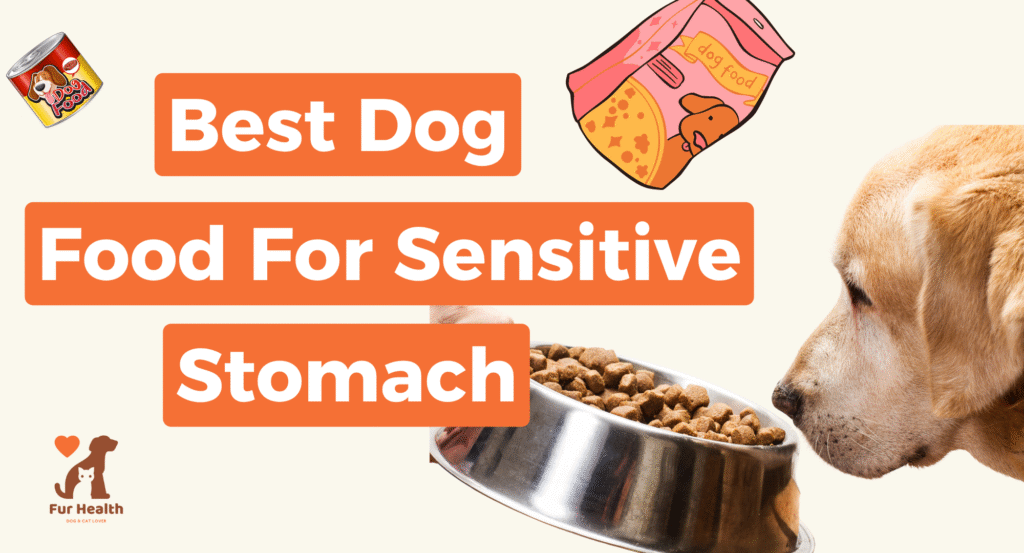Before You Choose the Best Dog Food for Sensitive Stomachs, Identify the Cause
Before you start shopping for the best dog food for sensitive stomachs, the first step is understanding why your dog is having digestive issues in the first place. Just like humans, some dogs are naturally sensitive to specific ingredients. For others, a sensitive stomach can signal an underlying health problem.
The smartest move? Book a vet appointment. Discuss your dog’s symptoms—whether it’s vomiting, diarrhea, loose stools, excessive gas, or something else entirely. Your vet may recommend bringing in a stool sample to test for parasites or rule out infections. They’ll also perform a full examination to check for more serious concerns.
While this process may seem like a lot of work, keep in mind that premium dog food isn’t cheap. Identifying the true cause of your dog’s tummy troubles can ultimately save you both money and stress—ensuring you aren’t guessing or switching foods unnecessarily.

Common Causes of Sensitive Stomachs in Dogs
Once major concerns like stomach cancer or infections are ruled out, it’s time to examine potential everyday causes of dog digestive sensitivity.
Here are a few possibilities:
- Protein sensitivity: Some dogs are allergic or intolerant to certain proteins, such as chicken or beef.
- Diet imbalance: Lack of essential nutrients (fiber, vitamins, minerals) or excessive fat in the diet can trigger upset.
- Non-food causes: If your dog frequently raids the trash or gets lots of treats or table scraps, the culprit may not be their main dog food at all.
Understanding these factors is key before making any changes to your dog’s diet.
Recognizing the Signs of a Sensitive Stomach
In dogs, the term “sensitive stomach” generally refers to mild digestive upset.
Common symptoms include:
- Occasional vomiting
- Loose stools
- Gas or bloating
Your dog might display one, two, or all of these symptoms. If they become severe, don’t delay—consult your vet immediately. Vomiting and diarrhea can signal a range of serious issues, and even excessive gas shouldn’t be ignored.
Using an Elimination Diet to Identify Triggers
If your dog’s diet is the suspected cause of their tummy troubles, a controlled elimination diet can help pinpoint the problem.
Here’s how to do it:
- In consultation with your vet, remove all extra food sources. No table scraps, no treats, no sneaky snacks.
- Closely monitor your dog’s behavior and stool for a few days.
- Make sure your dog can’t access trash bins, the garden, or anywhere else they might find forbidden food.
If symptoms persist after this controlled period—and you’re sure no other food sources are involved—it’s time to evaluate your dog’s current food and consider trying a new formula.
Ingredients That Commonly Upset Dog Stomachs
Dog foods are meant to be complete and balanced, but certain ingredients can still cause trouble for sensitive pups.
Here are key categories to consider:
Protein
Some dogs don’t tolerate specific proteins well. If your dog currently eats chicken-based food, switching to beef, lamb, or fish may help. Always eliminate extra treats during food trials for the most accurate results.
Fiber
Some sensitive dogs actually benefit from added fiber. Sources like beet pulp, psyllium, or inulin can support better digestion and stool quality. Talk to your vet about adding fiber to your dog’s diet or trying a high-fiber formula.
Fat Content
High-fat diets can be tough on sensitive stomachs. Check your dog food label—if fats and oils appear among the first few ingredients, the food may be too rich. Look for options with lower fat content after consulting your vet.
Vitamins & Minerals
While AAFCO-approved foods are formulated to be balanced, specialty diets (raw, home-cooked, life-stage mismatches) may lack essential nutrients. Work with your vet to ensure your dog’s diet meets their specific nutritional needs.
Ingredient Quality
Judging ingredient quality is tricky—labels won’t tell you the full story. Instead, look for brands with solid reputations, independent feeding trials, and guidance from veterinary nutritionists.

How to Choose High-Quality Dog Food for Sensitive Digestion
Selecting the right food can feel overwhelming, but a little research goes a long way.
Start by:
- Consulting your veterinarian or a veterinary nutritionist.
- Looking for “complete and balanced” on the food label.
- Reading ingredient lists carefully (protein source, fiber, fat content).
- Choosing a formula appropriate for your dog’s life stage.
Avoid hype and miracle claims. Stick with science-based brands that are transparent about their formulation and quality control.
Transitioning Your Dog to New Food
When introducing a new food, take it slow. Begin with 80-90% of your dog’s current food mixed with 10-20% new food. Gradually increase the new food ratio over 7–10 days. Rushing this process can worsen your dog’s symptoms or cause them to reject the new food.
Homemade Meals for Sensitive Stomachs
Occasionally, a simple bland homemade meal (plain cooked chicken and boiled rice) can help soothe an upset stomach. Some owners choose to feed homemade diets permanently—but be careful. Without proper planning, homemade meals can lack essential nutrients.
If you pursue this option, work closely with a veterinary nutritionist and consider using tools like Balance IT to ensure nutritional adequacy.
When Prescription Diets Are Necessary
For some dogs, over-the-counter solutions aren’t enough. If your dog continues struggling despite food trials, your vet may recommend a prescription diet designed for sensitive digestion.
Every dog is different—what works for one pup may not help another. Be patient, and trust your vet’s guidance as you explore the best path forward.
👉 Related Reading: Signs Your Dog Might Be in Pain — Learn how to recognize subtle pain symptoms in dogs. Pain and digestive distress often go hand in hand—addressing discomfort can improve overall gut health.
👉 Also Read: Dealing with Separation Anxiety in Small Dog Breeds: Proven Tips & Solutions — Anxiety can contribute to sensitive stomachs. Discover how calming your dog’s anxiety can ease digestion and boost their well-being.
